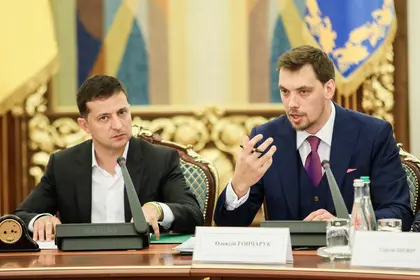President Volodymyr Zelensky has met with members of the newly elected Cabinet of Ministers and given them draft laws to prepare on strict deadlines.
By the end of the month, the government must adopt the 2020 budget, lower credit rates, list state-owned companies up for privatization and begin the process of legalizing casinos and amber mining, the president said during the Sept. 2 meeting.
JOIN US ON TELEGRAM
Follow our coverage of the war on the @Kyivpost_official.
Additionally, Zelensky gave the government a month to prepare the country for lifting the archaic moratorium on sale of farmland that has been in place for the last 16 years.
The meeting was a direct demonstration of the results of Zelensky’s massive electoral victory. With the parliamentary majority entirely under the control of his Servant of the People party, Zelensky can effectively give orders to both the legislature and the Cabinet.
Ambitious goal
After Servant of the People’s landslide victory in the July 21 parliamentary election, the parliament handed all top government posts to Zelensky loyalists.
Prime Minister Oleksiy Honcharuk, appointed on Aug. 29 during the parliament’s first session, opened the meeting by announcing that the legislature, Cabinet and president will all work together to rapidly implement changes.
According to Honcharuk, the government will aim to increase Ukraine’s economy by 40 percent in the span of five years, repair 24,000 kilometers of roads, review utilities prices, liberalize Ukraine’s financial regulations and also digitalize the country. By the end of the month, the government plans to cancel paperwork between different government agencies and replace it with electronic documents.
“Much needs to be done,” said Honcharuk.
Among the primary tasks, Honcharuk mentioned lifting the land moratorium, conducting a tax reform and stripping SBU, Ukraine’s security service, of its power to investigate financial crimes.
The moratorium on selling farmland was introduced in 2001 until a new Land Code could be adopted. However, that code was never drawn up and the moratorium stayed in place ever since. According to Satu Kahkonen, the World Bank country director for Ukraine, lifting the land moratorium would boost Ukraine’s gross domestic product by 2 percent.
Limiting the SBU’s power to investigate financial crimes has also been on the agenda for quite some time, with activists and non-governmental organizations arguing that these powers were often used to financially raid small and medium-sized business.
Taking responsibility
During the meeting, Zelensky said that his team’s immense power also brings immense responsibility. As a result, he gave personal instructions to the new ministers.
“We’re here to set strategic tasks, with deadlines and with people who will be responsible,” the president said.
The 2020 state budget must be presented to parliament no later than Sept. 15 and the law on legalizing casinos and amber mining must be presented no later than Oct. 1, Zelensky said.
According to multiple estimates, the black market for amber in Ukraine is worth nearly $500 million annually. Former lawmakers and wealthy businesspeople have been accused of using illegal amber mining to generate vast profits.
Meanwhile, the current lax gambling laws introduced in 2012 feature no effective mechanisms to regulate holders of state-issued lottery licenses. This allows license holders to open and operate gambling halls under the guise of lotteries.
Laws set to regulate the lifting the land moratorium must be introduced to parliament by the end of September and voted on no later than Dec. 1, Zelensky said.
Among other things, the Cabinet must propose a law on concession agreements that allow for private-public partnerships by Oct. 1, prepare a list of 500 small and medium-sized state-owned companies for privatization by Dec. 1, as well draft a new labor code by the end of the year.
Zelensky also set a Nov. 1 deadline for creating river transportation legislation, and ordered that all legislation required to reform state-owned railroad monopoly Ukrzaliznytsia must be passed by the end of the year. The latter reform process would liberalize cargo pricing on the railroad and permit private locomotives to use Ukrainian track.
In May, Ukrzaliznytsia chief Serhiy Kravtsov told the Kyiv Post that the railroad monopoly was unable to modernize its train park largely due to below-market prices on cargo transport. Earlier, Mykola Gorbachev, head of Ukraine’s grain association, said that permitting private locomotives would help grain producers cut costs on storage and transportation.
You can also highlight the text and press Ctrl + Enter




